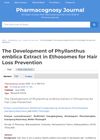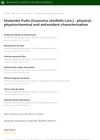2 citations,
June 2018 in “Jurnal Penelitian dan Pengembangan Pertanian” Antioxidant-rich maize varieties can improve health and need local support for widespread farming.
3 citations,
May 2020 in “Acta pharmaceutica” Protocatechuic acid can reduce melanin production and boost antioxidant activity in hair follicles.
 May 2022 in “Pharmacognosy journal”
May 2022 in “Pharmacognosy journal” Moringa seed oil may help prevent hair loss and promote hair growth.
1 citations,
March 2022 in “Protection convergence” Fermented green coffee beans may be good for scalp and hair health cosmetics.
 20 citations,
February 2013 in “Nutrition”
20 citations,
February 2013 in “Nutrition” Selenium-enriched green tea might be a safe prebiotic for gut health.
Some Himalayan plants with higher antioxidant activity can promote hair growth better.
 August 2019 in “Journal of the American Academy of Dermatology”
August 2019 in “Journal of the American Academy of Dermatology” Ginseng and Albizia extracts help prevent hair thinning with age.
 November 2024 in “Journal of Investigative Dermatology”
November 2024 in “Journal of Investigative Dermatology” Minoxidil rejuvenates hair follicles and reduces aging signs in male pattern baldness.
 12 citations,
April 2016 in “Chinese Medicine”
12 citations,
April 2016 in “Chinese Medicine” The research identified 12 antioxidant compounds in Polygonum multiflorum roots, suggesting these as quality markers for the plant's processed roots.

Melatonin can improve treatment and extend remission for certain skin conditions.
 3 citations,
June 2020 in “Pharmacognosy Journal”
3 citations,
June 2020 in “Pharmacognosy Journal” Phyllanthus emblica extract in ethosomes could potentially prevent hair loss.
 May 2020 in “Research, Society and Development”
May 2020 in “Research, Society and Development” Mutamba fruits are rich in soluble solids, vitamin C, and minerals, making them good for food industry use.
 August 2024 in “Frontiers in Nutrition”
August 2024 in “Frontiers in Nutrition” Antioxidant-rich diets may reduce hair loss risk, while pro-inflammatory diets may increase it, especially in women.
 7 citations,
January 2020 in “Postepy Dermatologii I Alergologii”
7 citations,
January 2020 in “Postepy Dermatologii I Alergologii” Oxidative stress plays a role in female pattern baldness, causing an imbalance between harmful and protective elements in the body.
 1 citations,
September 2023 in “Journal of Investigative Dermatology”
1 citations,
September 2023 in “Journal of Investigative Dermatology” Melatonin may protect hair follicle cells from damage caused by a chemotherapy drug.
September 2022 in “The Korean Tea Society” Houttuynia cordata compounds may help with anti-aging and hair loss.
 October 2024 in “Current Trends in Biotechnology and Pharmacy”
October 2024 in “Current Trends in Biotechnology and Pharmacy” The shampoo effectively promotes hair growth and is halal-compliant.
January 2019 in “The Pharma Innovation Journal” The best mix for a hair loss treatment cream is 10% Sophora japonica tincture and 5% Serenoa repens extract.
 November 2024 in “International Journal of Cosmetic Science”
November 2024 in “International Journal of Cosmetic Science” Botanical extracts can improve scalp health by reducing oxidative stress.
October 2022 in “Academic journal of science and technology” Stem cells, especially from fat, show promise for treating hair loss.
1 citations,
April 2022 in “Applied sciences” Bitter melon extract may help prevent hair loss and can be used in cosmetic products.
1 citations,
September 2021 in “Pharmaceutics” High-dose finasteride may help treat glioblastoma but needs localized delivery for effectiveness.
 233 citations,
February 2018 in “Polymers”
233 citations,
February 2018 in “Polymers” Chitin and chitosan are useful in cosmetics for oral care, haircare, and skincare, including UV protection and strength improvement.
1 citations,
January 2021 in “European Journal of Inflammation” Methylated flavonoids may effectively reduce depression and inflammation caused by finasteride.
46 citations,
September 2018 in “Expert Opinion on Drug Delivery” Melatonin in special carriers can help treat hair loss.
 December 2017 in “Dong-ui saengni byeongni hakoeji”
December 2017 in “Dong-ui saengni byeongni hakoeji” Cynanchi Wilfordii Radix has strong antioxidant effects and may help treat male hair loss.

Mealworm extract may help prevent hair loss and promote hair growth due to its antioxidant activity.
 40 citations,
December 2016 in “Journal of Ovarian Research”
40 citations,
December 2016 in “Journal of Ovarian Research” Rutin may help treat symptoms of polycystic ovary syndrome (PCOS) in rats.
 January 2002 in “Journal of Toxicology-cutaneous and Ocular Toxicology”
January 2002 in “Journal of Toxicology-cutaneous and Ocular Toxicology” Botanical extracts are increasingly important in cosmetics and drugs for their effectiveness and safety, backed by traditional use and scientific evidence.
 6 citations,
October 2016 in “Food Science and Biotechnology”
6 citations,
October 2016 in “Food Science and Biotechnology” The water extract of Bituminaria bituminosa, high in phenolic compounds, shows strong antioxidant and enzyme inhibitory potential.


















